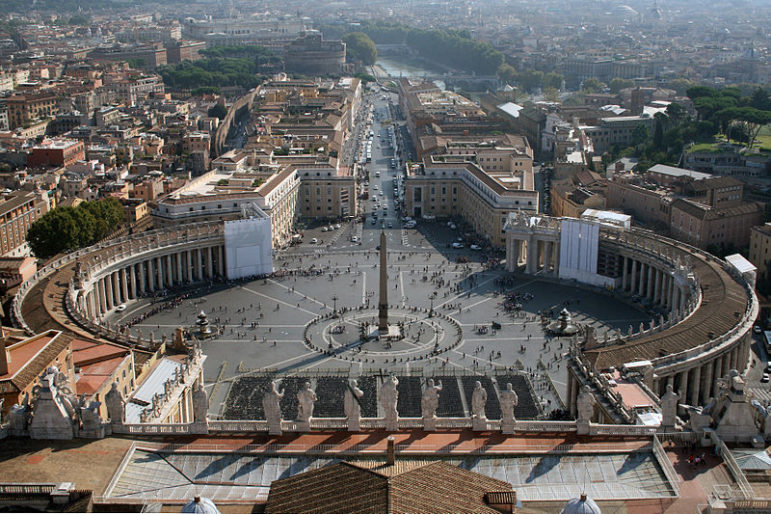
June 29, 2016; Crux
The Pontifical Council for Justice and Peace and Catholic Relief Services hosted a three-day Vatican conference on Impact Investing in Rome, from June 26 to 28, with this agenda. Celebrating the “Extraordinary Jubilee of Mercy” established by Pope Francis and his 2015 encyclical, “Laudato Si,” the conference was titled, “Making the Year of Mercy a Year of Impact for the Poor.”
Catholic Relief Services held a 3-day workshop before the conference for some of the speakers to discuss among themselves key concepts related to faith-based social enterprise and impact investing.
Here is an overview of the 2016 conference in tweets and photos. According to Carolyn Woo, President of CRS, the Church has had its social mission for the last 2,000 years, with a huge missionary zeal in the last 150 years, but it always lacks capital. Seeing that funds are now available, as a direct result of a change in mentality from many in the private sector, she believes it’s time to step up and say, “Are there some of our ministries that can be sustained by a larger pool of capital?” Some of the money coming from capital investing funds, she said, is actually Catholic money—from dioceses and religious orders to health care associations. Yet, it’s not being invested in Catholic ministries, she said, “because they haven’t organized themselves to be able to use investment capital.”
Conference speakers included Cardinal Peter K. A. Turkson, president, Pontifical Council for Justice and Peace; Dr. Carolyn Y. Woo, president and CEO, Catholic Relief Services; Matt Bannick, managing partner of Omidyar Network (one of the conference sponsors); Congressman John K. Delaney (D-MD), the only former CEO of a publicly traded company in the House of Representatives; Randall Kempner, executive director of the Aspen Network of Development Entrepreneurs (ANDE); Jacqueline Novogratz, founder and CEO of Acumen; and Amit Bouri, the CEO and cofounder of the Global Impact Investing Network (GIIN). In other words, most of the world’s impact investment leaders are attended the event.
The inaugural Vatican conference on Impact Investing was convened in 2014, at which time Pope Francis made this address, including the following statements:
[A sense of solidarity with the poor and with the marginalized has led you to reflect on impact investing as one emerging form of responsible investment. Representatives of the Roman Curia have joined you in these days of study aimed at assessing innovative forms of investment, which can benefit local communities and the environment, as well as providing a reasonable return. . . . It is important that ethics once again play its due part in the world of finance and that markets serve the interests of peoples and the common good of humanity. It is increasingly intolerable that financial markets are shaping the destiny of peoples rather than serving their needs, or that the few derive immense wealth from financial speculation while the many are deeply burdened by the consequences.
Sign up for our free newsletters
Subscribe to NPQ's newsletters to have our top stories delivered directly to your inbox.
By signing up, you agree to our privacy policy and terms of use, and to receive messages from NPQ and our partners.
The Catholic Church is no stranger to commerce and capitalism. Franciscan Friar Luca Bartolomeo de Pacioli is often called the “father of accounting,” because he was the first to publish a detailed description of the double-entry system. Today, the Knights of Columbus insurance operation has more than $100 billion worth of life insurance policies in force and $19.8 billion in assets.
The Financial Times looked at reasons why the Catholic Church would do well to embrace impact investing, not least as a way to appeal to the millennial generation that is expected to inherit some $30 trillion. “Fifty-eight percent of baby boomers say that social and environmental impact is important” with regard to their investments, says Jackie VanderBrug, investment strategist at US Trust. “Ninety-three percent of millennials will say that. In fact, millennials are starting to say, why are you even asking me this question?”
Nevertheless, the ethical bar is set very high for any impact investment strategies to receive the Pope’s blessing. In 2013, NPQ reported on Pope Francis’s “Evangelii Gaudem,” the “Apostolic Exhortation” in which he decried the effects of capitalism: “The worship of the ancient golden calf has returned in a new and ruthless guise in the idolatry of money and the dictatorship of an impersonal economy lacking a truly human purpose. The worldwide crisis affecting finance and the economy lays bare their imbalances and, above all, their lack of real concern for human beings; man is reduced to one of his needs alone: consumption.”
When the “People’s Pope” spoke before the US Congress, he cited Dorothy Day and Thomas Merton as exemplars of the Catholic Church’s values, and went on to rebuke unrestrained capitalism. In a speech in Bolivia, Pope Francis said this: “[B]ehind all this pain, death and destruction there is the stench of what Basil of Caesarea called ‘the dung of the devil’. An unfettered pursuit of money rules. The service of the common good is left behind. Once capital becomes an idol and guides people’s decisions, once greed for money presides over the entire socioeconomic system, it ruins society, it condemns and enslaves men and women, it destroys human fraternity, it sets people against one another and, as we clearly see, it even puts at risk our common home.”
Concerning the Vatican’s internal financial reform efforts, a Fortune magazine investigation reported Pope Francis as saying, “When the administration is fat, it’s unhealthy.” According to Fortune, Pope Francis “wanted a leaner, more efficient Vatican administration that would be solidly ‘self-sustaining.’ That, he said, would free up more money for his charities.”
NPQ has over the years reported on the emergence and practice of impact investing. More recently, NPQ raised the concern that “in a drive for global scale in impact investment, we will lose the voices that should matter the most—the billions of people who will be affected by social enterprises funded by our investments.” If any institution will be alert to this shortcoming of capitalism, the Vatican is most likely to remind us all that the beneficiaries of impact investing matter most and need “to be actively involved in the planning, execution, governance, and ownership of enterprises, and in the flows of capital connected with them.” In the words of the 2016 conference attendee, Jacqueline Novogratz of the Acumen Fund, “We need to have the humility to see the world as it really is.”—Jim Schaffer












